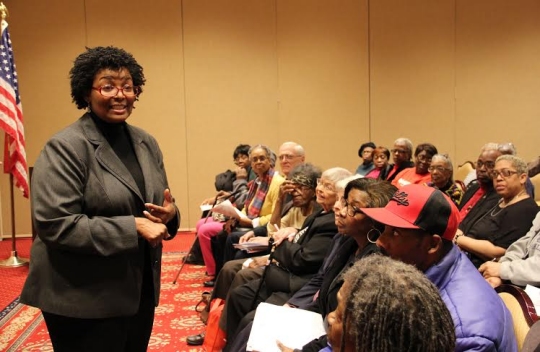 Del. Mary Washington speaks to the Baltimore caucus at the United Seniors of Maryland Legisltive Forum.
Del. Mary Washington speaks to the Baltimore caucus at the United Seniors of Maryland Legisltive Forum.ANNAPOLIS (Feb. 5, 2016)—Del. Mary Washington believes the state has a duty to better fund senior citizen centers that enable seniors to age in place. That's why the Baltimore Democrat is sponsoring a bill to increase the Senior Citizen Activities Center Operating Fund and also set a strict formula for its distribution, Washington told a Baltimore caucus at the United Seniors of Maryland Legislative Forum in Annapolis Wednesday.
“We must change the way we calculate the formula to reflect where seniors actually live,” she said to enthusiastic applause and cheers.
Her bill, HB 262, would double the fund from $500,000 to $1 million per year, and require that funding be distributed based on a jurisdiction’s share of low-income seniors. At least 50% of the fund must be distributed based on need, as calculated by the jurisdiction's average rates of unemployment and per capita personal income. At this time, no strict formula for state funding distribution to senior centers exists.
Funds cuts for Baltimore
The Maryland Department of Aging cut Baltimore's funding for the current fiscal year by two-thirds of what it had allocated for the city's 14 senior centers in fiscal 2015. In response, the Baltimore City Council met to request a state action to restore state funding for the city's Senior Center Operating Fund last October.
Elizabeth Briscoe, director of Action in Maturity, a senior center in Baltimore, said in an email that the reduction greatly affects Baltimore's senior centers.
“As a nonprofit, AIM could not exist with just government funding,” Briscoe wrote. “Therefore, I apply to several private foundations for support of operating and capital.”
What the centers do
Maryland has 19 area agencies on aging, which each one running its share of senior centers. According to the Department of Aging website, senior centers are “the hub of most nutrition and health promotion activities” for older Marylanders. While programming varies, centers typically offer a range of free and low-cost activities and services, including health screenings, fitness classes, medication consultations, nursing guidance and more.
“Our population is aging,” Washington said in an interview. “More and more people need the support of senior centers.”
She said that apart from offering recreation and community engagement, senior centers “provide access to information in a range of areas—legal, education and medical.” She cited how many people go to senior centers for financial literacy workshops and help understanding their medical bills.
“Centers are doing more and more,” she said, adding that their multi-faceted services are necessary.
“With the flattening in wages, people don't have the type of pension plans that offer full healthcare,” she said. “They don't have the same kind of federal and employer support [as in years past.]”
There also is the trend of seniors wanting to age in place, rather than moving to nursing homes.
Department promises no loss of funding
Earlier in the morning, Secretary of Aging Rona Kramer told the audience at the United Seniors of Maryland Legislative Forum that Gov. Hogan “put in an additional request so that no senior center will lose funding for the coming year” and that “it is very important for this administration to keep seniors healthy.”
“[If we keep seniors healthy], they will need fewer services, less money and their quality of life will improve,” she said.
She added that in order to keep seniors out of nursing homes, Maryland must work on fall prevention medication management training.
“Many seniors take 10 to 12 pills a day and it’s complicated,” Kramer said. “If we can provide medication management at home, we can keep people at home.”
She mentioned that the Department of Aging has received several bids on medication management trial programs.
Other state senior programs Kramer discussed included a trial grocery delivery program in Baltimore, pharmaceutical connection during Baltimore’s April unrest and check-in with seniors during the recent blizzard.
Reaching out to legislators
Seeing so many seniors in Annapolis for their lobbying day always impresses Washington. When one woman in the Baltimore caucus shouted out, “What can we do to help?”, Washington stressed how important it is for seniors to reach out to legislators.
“A lot of them don't know to do that,” she said. “Or they have a lot of pride for their self-sufficiency. But I want them to know it's OK to reach out for support.”
Washington also is developing a bill for a statewide senior citizen task force. She plans to model the bill after her similar legislation for unaccompanied homeless youth.
“We're almost at our peak population [for senior citizens],” she said. “And it's going to be a strain on our budget when we get there, so we have to plan for it.”


